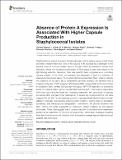Absence of protein A expression is associated with higher capsule production in staphylococcal isolates
Abstract
Staphylococcus aureus is a major human pathogen, and a leading cause of soft tissue and blood stream infections. One of the causes of its success as a pathogen is the peculiar array of immune evasion factors through which the bacterium avoids host defenses, where the staphylococcal protein A (SpA) plays a major role thanks to its IgG binding activities. Moreover, SpA has recently been proposed as a promising vaccine antigen. In this study, we evaluated the expression of SpA in a collection of staphylococcal strains, about 7% of which did not express SpA (SpA- strains), despite the presence of the gene. By a comparative genomic analysis, we identified that a mutation in the spa 5′ UTR sequence affecting the RBS is responsible for the loss of SpA in a subset of SpA- strains. Using a high-throughput qRT-PCR approach on a selected panel of virulence-related genes, we identified that the SpA- phenotype is associated with lower spa transcript levels and increased expression and production of capsule as well as other changes in the transcription of several key virulence factors. Our data suggest that the SpA- phenotype has occurred in geographically distinct strains through different molecular mechanisms including both mutation, leading likely to translation alterations, and transcriptional deregulation. Furthermore, we provide evidence that SpA- strains are highly susceptible to phagocytic uptake mediated by anti-capsule antibodies. These data suggest that S. aureus may alter its virulence factor expression pattern as an adaptation to the host or environment. Vaccination strategies targeting both SpA and capsule could therefore result in broader coverage against staphylococcal isolates than SpA alone.
Citation
Brignoli , T , Manetti , A G O , Rosini , R , Haag , A F , Scarlato , V , Bagnoli , F & Delany , I 2019 , ' Absence of protein A expression is associated with higher capsule production in staphylococcal isolates ' , Frontiers in Microbiology , vol. 10 , 863 . https://doi.org/10.3389/fmicb.2019.00863
Publication
Frontiers in Microbiology
Status
Peer reviewed
ISSN
1664-302XType
Journal article
Description
This study was sponsored by GlaxoSmithKline Biologicals SA which had a role in the study design, collection, analysis, interpretation of data and the writing of the manuscript as well as the decision to submit for its publication. TB is a Ph.D. student of the University of Bologna and received a GSK Ph.D. studentship and collaborated with GSK as part of his Ph.D. training from the University of Bologna. AH was a recipient of an Intra-European Fellowship (PIEF-GA-2012-328377).Collections
Items in the St Andrews Research Repository are protected by copyright, with all rights reserved, unless otherwise indicated.

